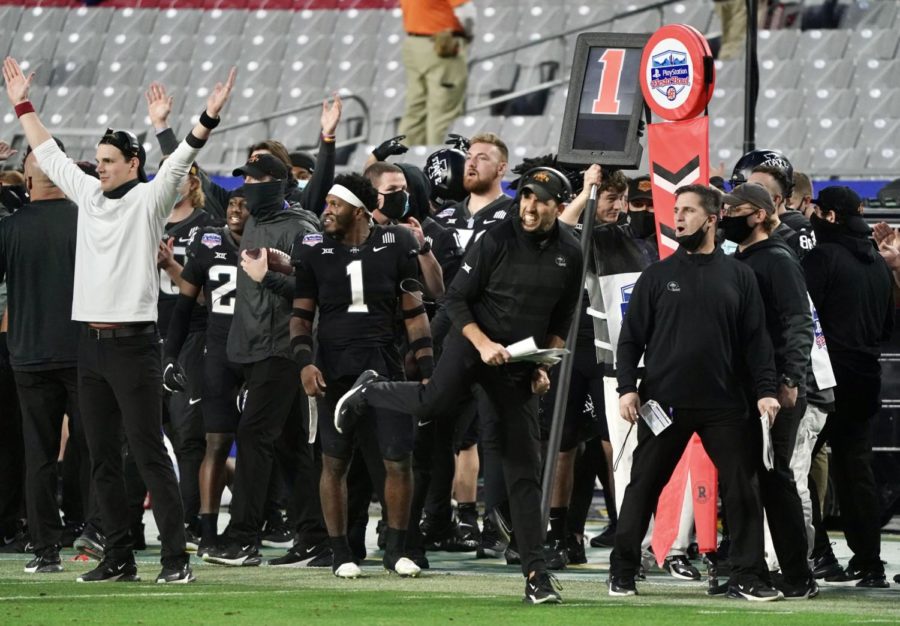Guest Column: CFP, the modern, sports-related Jim Crow
Guest columnist Eric Schultz thwarts the College Football Playoff with its bias toward high-league football leagues.
February 3, 2021
I recently read an article on ESPN regarding the American Athletic Conference commissioner criticizing the College Football Playoff (CFP) selection committee for dropping undefeated Cincinnati in its rankings behind three two-loss teams, including Iowa State. I could not agree more with his assessment.
A few years ago, I filed a resolution questioning the fairness of the CFP selection process. Colleagues laughed at it, with one telling me to my face that he thought the bill was a complete joke.
Now we have not one but two unbeaten teams who are about to join a list of other unbeaten teams, this time possibly at the expense of Iowa State.
The real joke in this entire process is the CFP selection committee. They are the ones who implement the sports equivalent of Jim Crow laws, telling Group of 5 teams to get in the back of the rankings while others are given biased spots based on color of their conference and nothing but pure opinion (and money). The only difference is inferior teams don’t get the death penalty (unless it is SMU).
Speaking of death penalty, I’d still like to know why Penn State hasn’t received one considering slush fund payments to players is far less taboo.
The fact of the matter is that teams cannot control certain things. Teams cannot control how good their conference is. UCF could not control a normally powerhouse Stanford team from dropping a goose egg in 2019, nor could they control matchups with Power 5 schools being canceled due to hurricanes in other years.
So why is the committee penalizing teams rather than providing them the opportunity to prove they belong like they say they do? Wasn’t that the whole point of a playoff in the first place? This is why a set of criteria is needed in order to remove as much human bias as possible.
I am not saying we should award the championship to Cincinnati or Coastal Carolina, but they at least deserve a chance to prove themselves. That is why I believe if granted a spot in the final four, Matt Campbell and/or Jamie Pollard should do the right thing and decline it.
As a former college athlete, I was not the best runner. I overcame a serious injury in high school where a doctor never thought I would run again. I fought and earned a scholarship on my previous school’s (Grand View University) track team before transferring here. Imagine if a committee selected national championship runners rather than a set of criteria to meet. My story would have made NAIA a bunch of good publicity (and money) on ESPN. I would have taken a spot from somebody who truly earned the right to have a shot and deserved to be there.
Clemson Coach Dabo Swinney once questioned the CFP selection process when his team was unbeaten and on the outside looking in.
Flip the script today and he is now critical of an unbeaten Ohio State team getting in because of the lack of games they had the opportunity to play.
I first wrote an op-ed after recently reading an article on ESPN regarding the American Athletic Conference commissioner criticizing the CFP selection committee for dropping undefeated Cincinnati in its rankings behind three two-loss teams, including Iowa State. I could not agree more with his assessment, but it is clear with those comments, coupled with Coach Swinney’s comments, that a controversial system is in desperate need of a set of criteria to ensure the right teams do not get left out.
My ideas of what needs to happen to the system are not perfect, but I believe if the CFP committee is truly caring about fairness (and not just about making the NCAA the most money possible), they should at least listen to what I have to say.
- The first thing I will say about the CFP process is going to be a bit controversial; the CFP should be expanded to eight teams, no less and certainly no more. Only the best teams in the country should have a shot, and capping it at eight teams will ensure no other team gets in. Four teams is too few and raises too much of a chance that the wrong teams are left out (2017 UCF). Besides, why wouldn’t the NCAA want four extra games on national TV?
- If a team goes undefeated, regardless of strength of schedule, they should be granted an automatic bid. This gives teams a chance to prove themselves and Americans an underdog to tune in and watch.
- Committee members should be limited to two teams per conference. If a team cannot even get a top-three finish in their respective conference, it should not compete for a national title; that includes the SEC.
- Also, on the same note as conferences, if a conference sends one or two teams to the playoff, one of those teams must be a conference champion. Having the ability to make it without winning your conference still puts emphasis on the importance of the regular season. This also insures at least four conferences are represented.
- The Quarterfinal Round shall not be a neutral. Rankings of the teams are up to the committee, with the top-four hosting the first round, but teams should earn the spot in the top four. Undefeated teams should be the first in line at hosting followed by conference champions. The idea of hosting a First-Round game puts emphasis on winning the conference as only the top four conference winners host.
Eric Schultz is a former Iowa State Student Government senator.







